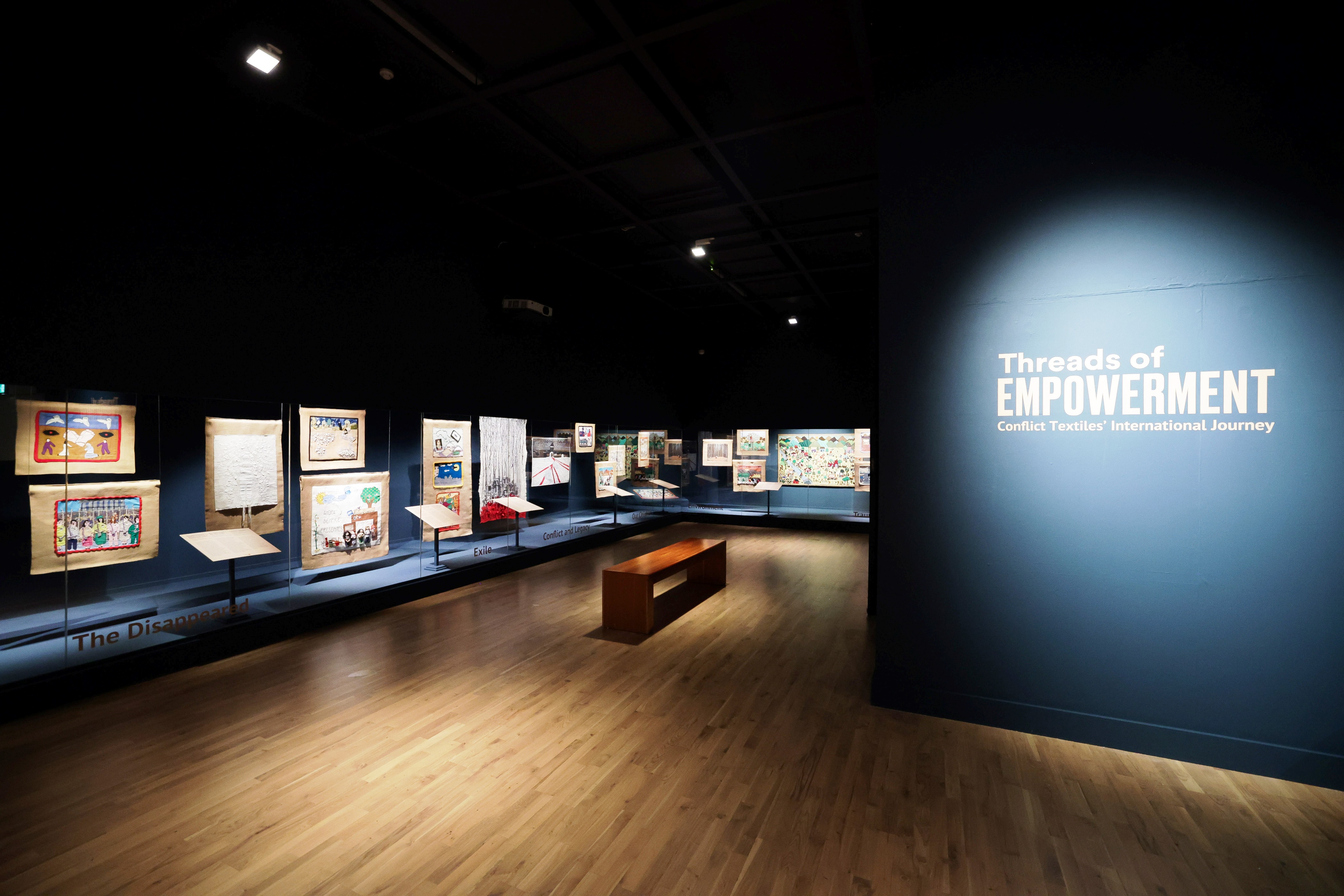Event Details

Exhibition space before being opened to the public (Photo: Elsie Doolan) |
| Exhibition and associated activities: | Threads of Empowerment: Conflict Textiles’ International Journey |
| Description: | When words are not enough to express our lived experiences, stitching and sewing emerge as textile language.
Through textile narrative, people from countries across the world have communicated their experiences in relation to violence and conflict, human rights violations, poverty, oppression and environmental issues. The result is a visual record and a form of artistic expression based on personal, and often very poignant testimonies.
The Ulster Museum has been collaborating with Conflict Textiles since 2017, drawing on their collection of over 400 documented arpilleras, quilts and wall hangings. Arpilleras (pronounced 'ar-pee-air-ahs') are appliquéd picture textiles, handsewn from scraps of materials onto a hessian backing. They originated in Chile during the Pinochet regime (1973-1990), when women came together to voice their experiences of the violence and repression of the dictatorship. The majority, but not all, of the makers are women.
From Chile but now based in Northern Ireland, Roberta Bacic, Collector and Curator of Conflict Textiles, has developed this collection and used it internationally to highlight the issues and people it represents. Beginning with the exhibition The Art of Survival: International and Irish Quilts in Derry/Londonderry in 2008, the Conflict Textiles collection has since been exhibited around the world, empowering people to share their story.
For further information please visit the Ulster Museum exhibition page.
The official press release by Ulster Museum was published after the preview.
On International Human Rights Day 2022, National Museums NI marked a landmark acquisition of 14 pieces from the Conflict Textiles collection. These are the pieces that were acquired at the time.
This specially commissioned film is a visit to Gallery 3, Ulster Museum.
A behind-the-scenes film shows the installation process.
There will be a discussion, workshop and guided tour commemorating International Day of the Victims of Enforced Disappearances 2024 (30th Aug).
The exhibition is part of the Belfast Arts Festival 2024 (16 Oct - 23 Nov).
Conflict Textiles Poetry Book Launch And Exhibition Tour (19th October, 3 to 4.30, Ulster Museum, Belfast Room).
Ramin Jahanbegloo, political philosopher from Iran, discusses nonviolent resistance and empowerment via nonviolence. It is Conflict Textiles, INNATE & the Hume O'Neill Chair in Peace (Ulster University) activity to be held at Ulster Museum on the 28th November, from 3 to 4.30.
Celebrate on 11th December 1 to 3 Human Rights Day at the Ulster Museum with with Conflict Textiles and Amnesty International.
Join exhibiting artist Janet Wilkinson as she shares how she became involved in this textile trail, Walking Alongside the Arpilleras, that stretches from Chile to Northern Ireland to Liverpool, and across the world. Filmed by Rebekah Davis.
The closing and last associated event is on Thursday 24th April. Heidi Drahota, longstanding textile artist who has contributed since 2009, will give a presentation and a hands-on workshop in the Belfast Room.
These 2 photo galleries are an account by 2 participants, Saray Sánchez, from Mexico and Elsie Doolan from USA. |
| Commissioned by: | Ulster Museum and Conflict Textiles |
| Date(s): | 21st June 2024 - 27th April 2025 |
| Venue: | Ulster Museum, Belfast, Northern Ireland
Botanic Gardens, Belfast BT9 5AB, Northern Ireland |
| Curator: | Conflict Textiles curator Roberta Bacic |
| Facilitator: | Karen Logan and Kim Mawhinney, Ulster Museum senior curators |
| Outcome: | Threads of Empowerment was a highly successful exhibition as well as its associated programme. The number of visitors is an estimate of approximate over 240K, which makes it a very popular exhibition at the Ulster Museum. Many of those who visited had never been to the museum before and it brought into the UM new audiences.
Following a major preview on June 20th 2024 there were 29 associated activities which included: guided tours, poetry reading as part of Belfast International Arts Festival in October 2024 and the 4 day long symposium "Stitching Solidarity: Activism in Textile Art" early March 2025.
Several workshops were delivered; a series of 3 "behind the scenes" films were filmed by Rebekah Davis from National Museums NI and a short film was commissioned to Andrew Proctor from Kavod Films to reach out to contributors, our transnational network and interested people who could not make it to Belfast.
It was a great pleasure for us that several of the textile artists were able to visit and contribute. |
| Documents: |
• Textile list: Threads of Empowerment, Feb. 24 - view
• Introduction to Conflict Textiles - view
• Leaflet: Threads of Empowerment & Satellites - view
• Threads of Empowerment Opening Statement - view
• Press Release (accessed 24/06/24) - view
• Photo Gallery: ToE Transfer and Setup - view
• Nonviolence & Empowerment discussion 28/11 UM - view
• 28/11 event review by Carlos Villaseñor - view
• Amnesty interview with curator, winter 24 - view
• Belfast Telegraph interview w curator - 24/08 - view
• Human Rights Day Photo gallery 2024 - view
• H. Drahota workshop by S. Sanchez 2025-05-03 - view
• H. Drahota workshop by E. Doolan 2025-05-03 - view
|
|